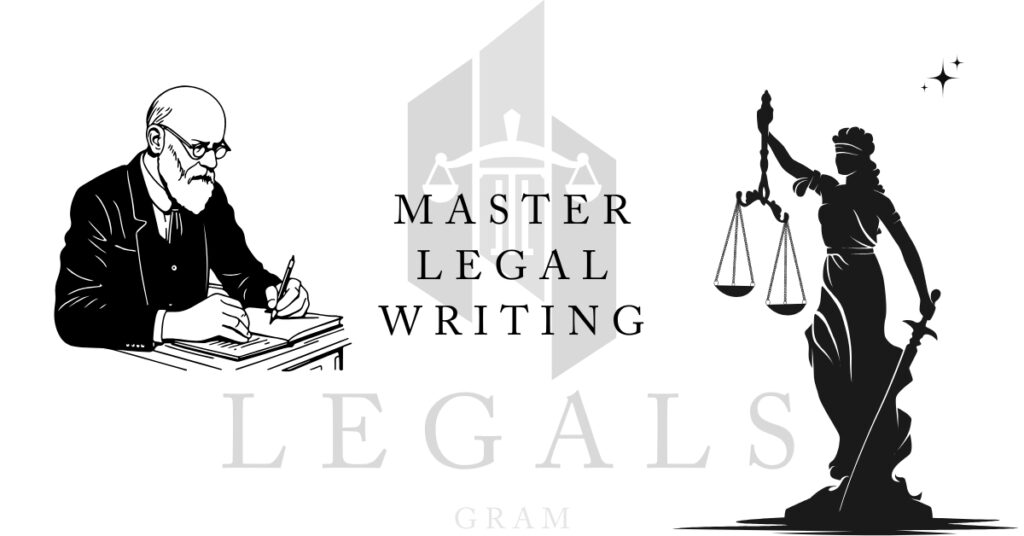The way you write your case in legal terms can lead to the outcome you want or not. The way you present your arguments in writing plays a big role in deciding what the judge agrees with. If your writing is not good enough, facts might not help your case.
You will learn from this guide how to create legal documents that will convince judges and appear in scholarly journals. This material will focus on the qualities that make a lawyer’s writing stand out.
Why Legal Writing Matters More Than Ever
There are many cases that courts are required to handle. A judge will go through a brief in minutes instead of hours. Your text should immediately catch readers’ interest and take them to your conclusion.
Every year, law journals are submitted a large amount of articles. Most articles get rejected by editors in the first part of the document. Impressive writing can make the difference between an accepted article and one that ends up in the ‘rejected’ pile.
The main purpose of legal writing is to clarify matters and also persuade people. You are required to express complicated topics simply and use a convincing strategy.
The Foundation: Clear Structure
Start with Your Conclusion: Start off by mentioning your best skill. Clearly ask the judges what specific actions they should take. Don’t make users search too much for the information you are seeking.
The Court should issue a dismissal because Plaintiff did not include enough information for a claim.
Use Roadmap Sentences: Explain to readers what topic you will cover. A roadmap sentence gives judges an idea of what your points will be.
The brief states that the contract does not have consideration, enforcement cannot happen due to the statute of frauds, and Plaintiff has waived its rights due to a delay.
Follow the IRAC Method
- Issue: What legal question needs answering?
- Rule: What law applies to this situation?
- Application: How does the law apply to your facts?
- Conclusion: What result should follow?
This structure works for briefs, memos, and journal articles. Judges and editors expect this logical flow.
Writing Powerful Openings
Hook Readers Immediately: Internet users decide if they will continue reading based on the main sentence. You might want to begin with a good fact, interesting number, or clear issue that needs addressing.
A weaker way to begin could be: “There are many issues regarding how the contract should be interpreted in this case.”
The article starts with an interesting detail: “A two million dollar oral contract led to a three-year legal dispute that might change business deals.”
State Your Theme Early: It is important that every effective brief revolves around a key point. Include your values and ensure they are part of the whole document.
For example, the theme presents that the defendant was proceeding honestly, while the plaintiff’s actions involved shrewdness.
Answer the “So What?” Question: Explain The reason why your case deserves attention. What larger concept is involved in this issue? Why should judges who are handling many cases pay attention to your client’s problem?
Crafting Compelling Arguments
Lead with Your Strongest Point: Don’t hold the most important point you have for the closing of your argument. It may happen that judges don’t even finish reading the decision. Ensure you get off to a good start and that you keep your energy going as well.
Use Active Voice: Sentences made in the active voice are clearer and more effective. It shows who should take action and advances your ideas.
The contract was prepared wrongly during the negotiation stage. Plaintiff ’s attorney was negligent during the process of negotiating the contract.
Choose Concrete Words: Distinct words are stronger than general words when you try to change someone’s mind. Use your language to draw vivid images in peoples’ minds.
Vague: “It happened all at once.” Concrete: Three seconds is how much time the collision lasted.
Support Every Claim: Support what you say with solid proof. Having citations, rulings from the courts, and factual evidence makes your viewpoint stronger.
Courts hardly approve these kinds of requests. The number of employment discrimination cases where district courts award summary judgment is very small, since they do it in only 6% of cases. Smith v. In Jones, 123 F.3d 456 (2020) by the Fifth Circuit Court, the court decided the following:
Mastering Legal Citations
Learn Bluebook Rules The Bluebook governs legal citation format. Master the basics:
- Case names in italics
- Proper court abbreviations
- Correct date formats
- Pin citations to specific pages
Use Parentheticals Effectively: They explain the reason you are mentioning a case as an example. They make it easier for judges to see what is important in the case without reading the whole opinion.
An example is when Jones v. In Smith (456 F.3d 789, 2019), the Seventh Circuit stated that emails can be used to satisfy the statute of frauds under real estate contracts.
Cite Recent Cases: Latest cases are more important than those from the past. Be sure to update your information and always mention the most recent authority.

Writing for Different Audiences
Trial Court Briefs: The judges in these cases are mainly interested in finding workable alternatives. RS refers to facts and the clear rules of the law. Avoid using complex arguments about the constitution only if they are required.
Ideally, your brief shouldn’t be more than 25 pages. Employ headings and bullet points to separate extensive bits of text. Keep the information in your brief easy to go through quickly.
Appellate Briefs: Appellate courts mainly study and follow past cases and court decisions. Great weight should also be given to how a law could impact national policy and more than one issue.
Put together a story that keeps the audience engaged. No judge who hears the appeal actually met your client or listened to witnesses. Make your story vivid for the reader.
Law Journal Articles: In academics, writers need to look into information deeply and generate their own ideas. Give a new perspective to legal scholarship.
The first step is to look at the research literature. Have scholarship books and articles been produced on your topic? What does your article bring to the topic that is valuable?
The Art of Persuasive Language
Choose Words Carefully Every word choice affects tone and meaning. Compare these descriptions of the same action:
Neutral: “Defendant terminated the agreement.” Negative: “Defendant breached the contract.” Positive: “Defendant exercised its contractual right to terminate.”
Use Metaphors Sparingly Legal writing isn’t poetry. Use metaphors only when they clarify complex concepts.
Good metaphor: “The contract serves as a roadmap for the parties’ relationship.” Bad metaphor: “Justice flows like a mighty river through the courtroom.”
Avoid Emotional Language Facts and law should drive your arguments, not emotions. Let strong facts speak for themselves.
Emotional: “Plaintiff’s outrageous conduct shocks the conscience.” Professional: “Plaintiff’s conduct violated established industry standards and caused substantial harm.”
Editing and Revision Strategies
Read Aloud: Sometimes, the only way to detect a problem is by using your ears since your eyes might not catch it. Mistakes in writing shy away easily when people look at what you say.
Cut Ruthlessly: Every bit of writing should be considered carefully before going in. Take away any adjectives or phrases that add nothing to the meaning.
Before: “It is quite clear that the defendant’s obviously inappropriate behavior was completely unacceptable.” After: “Defendant’s behavior was unacceptable.”
Check Transitions: Smooth changes from one point to the next make reading your argument easy for your audience. the paragraphs should be connected so that a reader can easily move from one to the next.
Verify Every Citation: If you offer incorrect references in your writing, it’s harder for the audience to trust your work. Take care to check the names of the parties, the page references, and data about the court.
Common Legal Writing Mistakes
Overusing Legalese: Plain English makes your case more effectively than outdated words used in law. Address your writing to people, not scholars and writers.
Avoid: “Wherefore, premises considered, Plaintiff respectfully prays…” Use: “For these reasons, Plaintiff requests…”
Burying the Lead: Don’t keep the key point hidden in the middle of the paragraph. Present the main point first when you’re making your argument.
Writing Too Long: Judges prefer communications that are brief. Say what you want to say and continue with your argument. Explaining things in an overly long way makes readers less interested.
Ignoring Court Rules: Every court uses a particular format. Implement these steps as they are. When you violate the rules, it is simple for other people to question your decisions.
Tools and Resources for Better Writing
Grammar Checkers: Running your writing through Grammarly or ProWritingAid will help you detect basic mistakes. Rely on them partly, as they can help you find some mistakes.
Legal Research Platforms: Both Westlaw and Lexis give you strong tools for finding information. Knowing how to search for your specific needs will allow you to find them more easily.
Style Guides: Keep Bryan Garner’s “Legal Writing in Plain English” and “The Redbook” nearby. These guides answer common style questions.
Writing Groups: You can become part of legal writing organizations or establish a team with your colleagues. Getting feedback from others will make your skills develop at a quicker pace.
Developing Your Writing Process
Starting with Research: A good basis for writing comes from thorough research. Check what is allowed before you put your thoughts into writing.
Create Detailed Outlines: When a detailed outline is made, writer’s block is less likely and arguments stay neat. Plan out your essay before getting to the writing process.
Write Multiple Drafts: It is important to put your ideas down in the first draft. While drafting again, one organizes their ideas. On the third draft, the language is reviewed and errors in citations are removed.
Seek Feedback Early: Give your drafts to your teammates before the deadlines so they can review them. Other people may find issues that you didn’t notice.
Keep a Writing Journal: Record your performance and identify the areas that are weak and the ones that do well. Bear in mind the criticisms and suggestions you get from editors and judges. Check your mistakes to find any similarities.
Publishing in Law Journals
Choose the Right Journal: Choose an area of study that fits with what the journal values. An article about tax law can’t be accepted in a criminal law journal.
Make certain that you follow the outlined submission guidelines. Every journal requires authors to mention references, use a given format, and write within a certain length.
Craft Strong Abstracts: A lot of journals decide whether to publish on the basis of the abstract. Make sure your thesis, the way you did your research, and your conclusions are easy to understand.
Time Your Submissions: Send in your articles during the times when journals are recruiting articles. The majority of student journals seek to hire new members in the fall and in the spring.
Handle Rejections Professionally: It is normal to be rejected at some point. Let editors give you comments before you send your article to another site.
Advanced Techniques
Use Sophisticated Sentence Structure: Change the way you make your sentences to keep the language interesting. Include both straightforward and detailed ideas when you write. It produces a lively flow and keeps the narration interesting.
Master Paragraph Transitions: When transitions are solid, it becomes easier for your ideas to follow one another. Include sentences that help move from one section to the next one.
Developing Your Voice: A professional decor style can still be exciting. Create a unique and assured writing style that helps you present your arguments.
Know Your Judges: Find out who the judges will be in your contest. Knowing what they like makes it easier to create an approach that suits them.
Building Long-Term Skills
Read Excellent Legal Writing: Look at briefing books made by leading Supreme Court lawyers. Go through the written opinions of courts. Identify the things that make these strategies successful.
Take Continuing Education Courses: A lot of bar associations arrange classes on legal writing. They introduce learners to the best modern approaches and new technology.
Practice Regularly: If you do not write often, your writing skills will become worse. Prepare at least one legal document every week, no matter how short it is.
Teach Others: Teaching yourself makes you explain rules in a straightforward manner. Support new attorneys by providing them with advice, or help judge various moot court events.
Measuring Your Progress
Track Success Rates: Monitor how often your motions succeed and articles get published. Look for patterns in wins and losses.
Collect Feedback: Save comments from judges, editors, and colleagues. Review feedback periodically to identify improvement areas.
Set Writing Goals: Establish specific, measurable goals. “Write clearer topic sentences” works better than “improve writing generally.”
Celebrate Improvements: Acknowledge progress along the way. Legal writing mastery takes years to develop.
Conclusion
Good legal writing brings together logical ideas with effective communication. Your actions help clients and enhance your career as an attorney. Stop Failing Law Exams: 10 Study Tricks You Need Right Now
Make sure to build your assignment with a reliable structure and simple, clear words. Next, enhance your arguments using advanced knowledge and make sure your presentation is attractive. Keep working on your singing often, and make sure to receive feedback from those who can help you. How To Avoid 5 Common Mistakes Law Students Make on Exams
Your written work stands as evidence in court and journals even after you’ve finished speaking. Try to use every word purposefully. Better writing skills help you succeed and advance over the course of your legal career. The Ultimate Guide to Legal Research for Young Lawyers
Adopt these skills as soon as you can. Your actions will benefit your valued clients, your cases, and your career.



